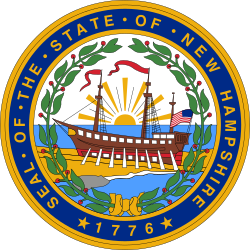Electoral system
After the 1948 presidential primary, the New Hampshire state legislature, concerned by low voter turnout, passed a law that introduced a "presidential preference primary" to the election. [3] For the first time, ballots would include the candidates' names—voters could indicate their preference for candidates for president and vice president directly, as well as indirectly by voting for the delegates their party would sent to the convention, where the candidates for president and vice president would be nominated.
Because the "direct" votes had no bearing on the election of delegates, this new feature of the election was described as a "beauty contest" between the major candidates. [4] Delegates were still elected separately, but under the new rules they could indicate their allegiance as "pledged" or "favorable" to a candidate, only the former of which was legally binding and required the candidate's written consent. [3] All Republican delegates in 1952 ran as "favorable" or undeclared; none were "pledged" to a candidate. [1]
This page is based on this
Wikipedia article Text is available under the
CC BY-SA 4.0 license; additional terms may apply.
Images, videos and audio are available under their respective licenses.





